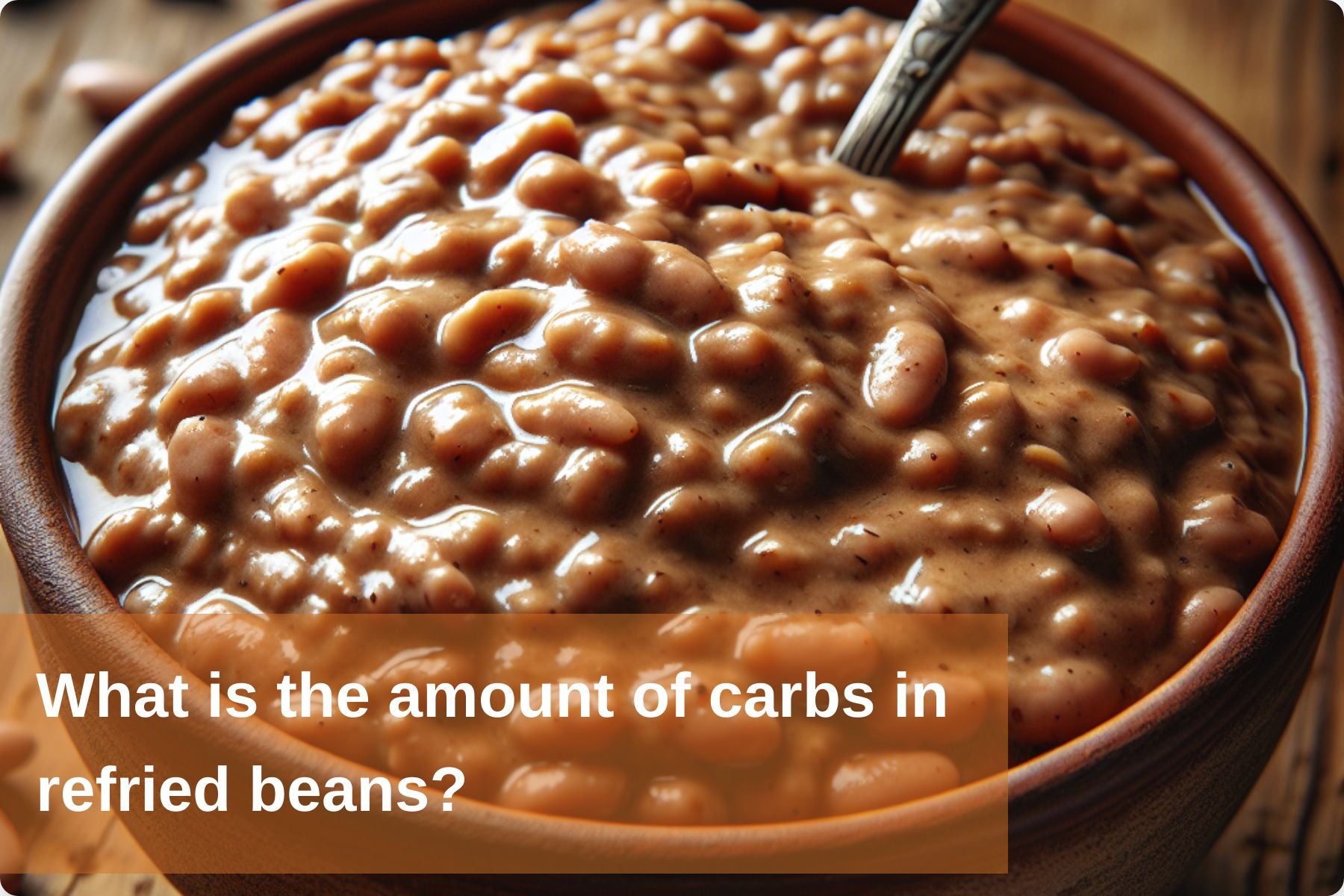
What is the amount of carbs in refried beans?
Refried beans, with their rich, savory taste, are popular in many cuisines as a side or main dish. But as we enjoy their flavor, it's key to understand their nutrition, especially the carb content. Knowing a food's carbs is essential for smart eating.
Carbs provide energy, so tracking them in favorite foods like refried beans helps balance our diet. In this exploration, we'll break down the nutrition of refried beans, focusing on their carb quantity. Let's uncover the secrets behind the carbs in refried beans and see how this informs healthy choices.
The goal is enjoying their taste while making carb-conscious decisions. With greater awareness, we can savor refried beans as part of an overall balanced diet.

Nutritional Composition of Refried Beans
Nutrition Facts for Refried Beans (1 cup, 238g):
Calories |
214 |
|
Total Fat |
4.8g |
6% Daily Value |
Saturated Fat |
1.5g |
8% Daily Value |
Trans Fat |
0g |
|
Polyunsaturated Fat |
1.3g |
|
Monounsaturated Fat |
1.4g |
|
Cholesterol |
0mg |
0% Daily Value |
Sodium |
881mg |
38% Daily Value |
Total Carbohydrates |
32g |
12% Daily Value |
Dietary Fiber |
8.8g |
31% Daily Value |
Sugars |
1.3g |
|
Protein |
12g |
|
Vitamin D |
0mcg |
0% Daily Value |
Calcium |
69mg |
5% Daily Value |
Iron |
3.4mg |
19% Daily Value |
Potassium |
759.2mg |
16% Daily Value |
Refried Beans at home
Ingredients:
2 cups dried pinto beans or black beans
1 medium onion, finely chopped
3 cloves garlic, minced
1 tsp cumin (optional)
Salt to taste
2-3 tbsp vegetable oil, lard, or bacon fat
Water or chicken/vegetable broth
Preparation:
Soak the Beans: Rinse and soak dried beans in water overnight or for at least 8 hours.
Cooking the Beans:
Drain and Rinse: After soaking, drain and rinse the beans.
Cook the Beans: Place beans in a large pot, cover with fresh water or broth, and bring to a boil. Reduce heat and simmer for 1.5 to 2 hours until beans are tender.
Flavoring the Beans:
Sauté Onions and Garlic: In a large skillet, heat oil over medium heat. Add chopped onion and cook until translucent, about 5 minutes. Add minced garlic and cook for another minute.
Add Cooked Beans: Using a slotted spoon, transfer the cooked beans to the skillet, reserving the cooking liquid.
Season: Add cumin (if using) and salt to taste.
Mashing the Beans:
Mash the Beans: Using a potato masher or the back of a spoon, mash the beans in the skillet. Add reserved cooking liquid gradually to reach desired consistency. Continue mashing until smooth and creamy, about 10-15 minutes.
Adjusting Consistency:
Adjust Liquids: If beans are too thick, add more cooking liquid or broth. If too thin, cook longer to evaporate excess liquid.
Finishing Touches:
Taste and Adjust: Taste and adjust seasoning as needed. Optionally, add a squeeze of lime juice for extra flavor.
Serving:
Serve Hot: Serve refried beans hot as a side dish, in tacos, burritos, or as a dip with tortilla chips.
Storage:
Store Leftovers: Cool and store any leftovers in an airtight container in the refrigerator for up to 5 days or freeze for up to 3 months.

Refried Beans: Carbohydrate Count
Our exploration into the world of refried beans sheds light on their nutritional composition, with a specific focus on carbohydrates. We've learned that while refried beans offer a delightful mix of flavors, they also bring a host of essential nutrients to the table.
The nutritional composition of refried beans goes beyond just carbohydrates, encompassing protein, fiber, and various essential minerals. Understanding the types of carbohydrates present, particularly the complex carbs and the beneficial impact of fiber, allows us to appreciate the holistic nutritional value of this popular dish.
While carbohydrates are a fundamental energy source, an understanding of their types and quantities aids in making informed dietary choices. Carb awareness is not about restriction but about balance and moderation, ensuring that we nourish our bodies while savoring the foods we love.
In the journey of maintaining a healthy lifestyle, knowledge is power. Armed with the insights gained here, let's approach our meals with a sense of mindfulness, embracing the nutritional benefits of refried beans and making choices that contribute positively to our overall health and well-being.
FAQs
-
How many carbs are in a serving of refried beans?
A typical serving of refried beans contains approximately 20-25 grams of carbohydrates.
-
Are refried beans a good source of fiber?
Yes, refried beans are a good source of fiber, with about 5-7 grams per serving, depending on the brand and preparation.
-
Can refried beans be part of a low-carb diet?
While refried beans do contain carbohydrates, they can still be included in moderation as part of a balanced low-carb diet.
This Blog post is an initiative by Lo! Foods, to provide accurate and Nutritionist / Doctor approved information related to Health. Lo! Foods is India's leading brand for Everyday Functional Foods. Foods designed for specific Health conditions or Needs. Lo! Foods also runs India's largest range of Low Carb Healthy Cloud Kitchens, under the brand names of Lo!, ProteinChef, ATH (All Things Healthy) and DiabeSmart.















Leave a comment
Your email address will not be published.